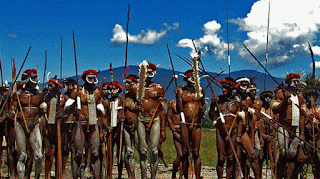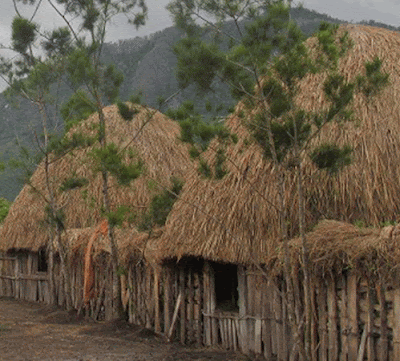Balliem Valley
Baliem Valley and the Dani
tribe waited a long time to be discovered. Papuan highland belongs to one the
most recently explored New Guinea areas. The tall mountains in west Papua
(Irian Jaya) were generally considered as uninhabited. No sooner than 1398 did
the pilot Richard Archbold notice that there was something special about the
deep, and large valley situated among the four-thousand meter tall mountains.
In the valley there were clearly recognizable fields, similar to those he knew
from Europe. The Baliem valley and Dani tribe were discovered by pure luck.
To reach the Baliem Valley,
one has to fly to Jayapura, the capital city of West Papua province. From
Jayapura then fly to Wamena town, the capital city of Baliem Valley. This
flight takes 45 minutes passing over the tropical jungles and the land of West
Papua. Wamena town has been developing some tourist facilities and become one
of the center of economy and new culture for West Papua after Jayapura.
Visiting the area of West Papua need government permit which can be arranged
before arrival by sending your passport photocopy to the local tour agent in
Indonesia.The nature of tour on the island of West Papua are all in an adventurous
activities with ready physical condition to stay in an open nature or simple
huts belong to the local people, and fit to walk dozens of kilo meters if wish
to see the inner part of the villages. Visiting both Dani People or Yali people
must be communicated far in advance in a detail manner, so traveler will
understand the situation of the location that will be visited, at least there
is an idea of what will be the condition in the field. This is very important
to prepare travelers to the natural condition of the island and country.
The Baliem Valley was once
dubbed Shangri La and it is easy to see why. The Valley is incredibly lush and
fertile and is surrounded on all sides by towering peaks of 2,500 to 3,000
metres. The fertility is such that the valley has been farmed for 9,000 years
but it was only discovered by westerners in 1938! There are three mains tribes
inhabiting the Baliem Valley: The Dani in the base, the Lani to the west and
the Yali in the south-east. Each tribe has a distinct culture. One sure and
interesting way to distinguish between the tribes is from the Koteka, or penis
gourd, sported by the male members. The men of each tribe tend to the growing
of the gourds with the three tribes each cultivating a different style. The
Dani use a long, thin Koteka, the Lani sport a medium sized, wide cannon-like
gourd, and the Yali wear the longest of all.
The inevitable pig-feast on
arrival is your rite of passage into their unique culture for an engrossing a
four or five hour intense experience. You will find yourself in a simple,
traditional compound surrounded by fully greased and painted Dani tribes-people
wearing their ceremonial best.The
Valley remains one of the last places on the face of the Earth where people
continue living in semi-Neolithic circumstances. Upon the spectacular approach
by air, the tourists will notice the total isolation of the area. Sealed of the
rest of the world by mighty mountain walls and without any roads leading from
the coast to the inner region, the Valley keeps its own secrets.
Villages of no more than a few
families are dispersed throughout this rough and mountainous region. Dani is a
generic name of a series of tribes, until recently adhering to a Neolithic
lifestyle. Only by the sixties of last century, they adopted the use of iron.
Their dark complexions underline a Negroid origin, something that
differentiates from the other Indonesian people. There are numerous tribes
residing in the valley, having quite different languages and customs. The Yali,
Kimial, Ok and Eipomek claim the eastern periphery of the magnificent valley.
It is relatively easy to find their villages under the shelter of rainforest
and highland.
Within the small town of Wamena, most
Dani people clad in westerns style clothes. If we venture out however, chances
are high we'll have an encounter with a fascinating Dani in full regalia
Indeed, the Dani people much prefer to walk around naked save for a koteka or a
tube-like yellow gourd, worn over the penis. The bodies of the male Dani gleam
with pork fat, applied to fight of the cold. At an altitude of 1.600 m,
temperature can be quite low, especially at night.Jayawijaya Peak, a roaring
mountain is permanently covered with snow, despite its location on the equator.
We'll quite never forget meeting an awful-looking Dani, bearing the tusk of a
wild pig at the tip of his nose. Despite their groovy looks, these are quite
gentle people, shaking your hand politely and always having time for a small
chat.
Likewise, women don't wear terribly
much clothes. Just a skirt, entirely made of natural materials will do. It is
the women's duty to carry out the heavy work on the fields. Observe the nuke,
typical cloak-like bark string bags, carried half over the head. Heavily loaded
with cabbage, sweet potatoes and sago, they resemble a blanket. A woman covered
in river mud, is in grief. A less innocent way to show mourning, is finger
amputation, a fate that only women will befall. Despite serious efforts of the
government to halt this practice, they continue being reported occasionally.
The Baliem Valley remains one of the
most fascinating places on the planet, where man may confront it its
prehistoric past. But even in the remotest of area. Civilization is seeping
through and will not be kept at bay. Maybe the time is right to visit the wild
beauty of the Baliem Valley and its remarkable people.If you are planning to
visit the Baliem Valley of Papua, then the days between March and August are
considerably drier than other months. Of note, coastal resorts tend to be hotter
and more humid than towns around the highlands area.




















